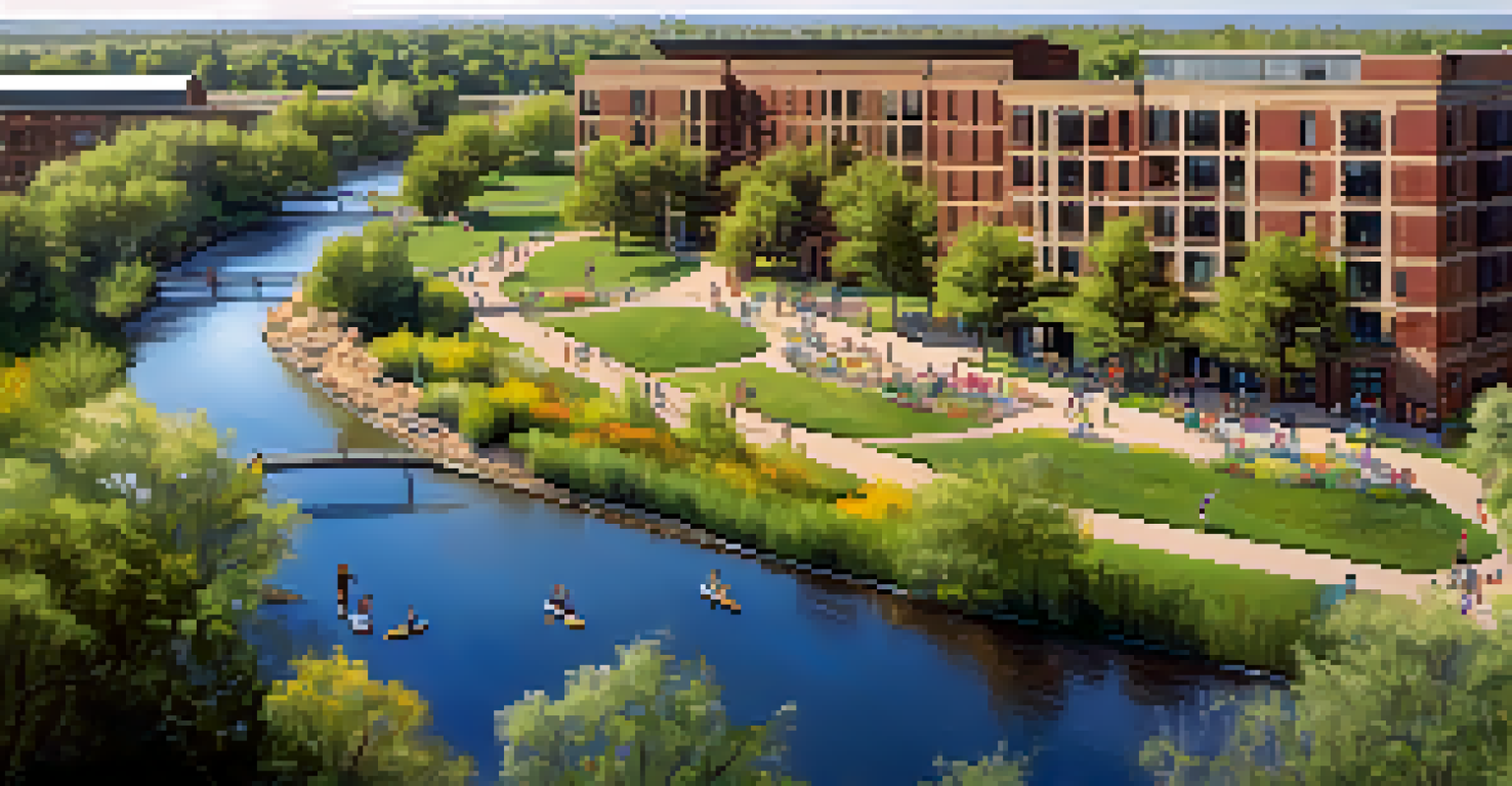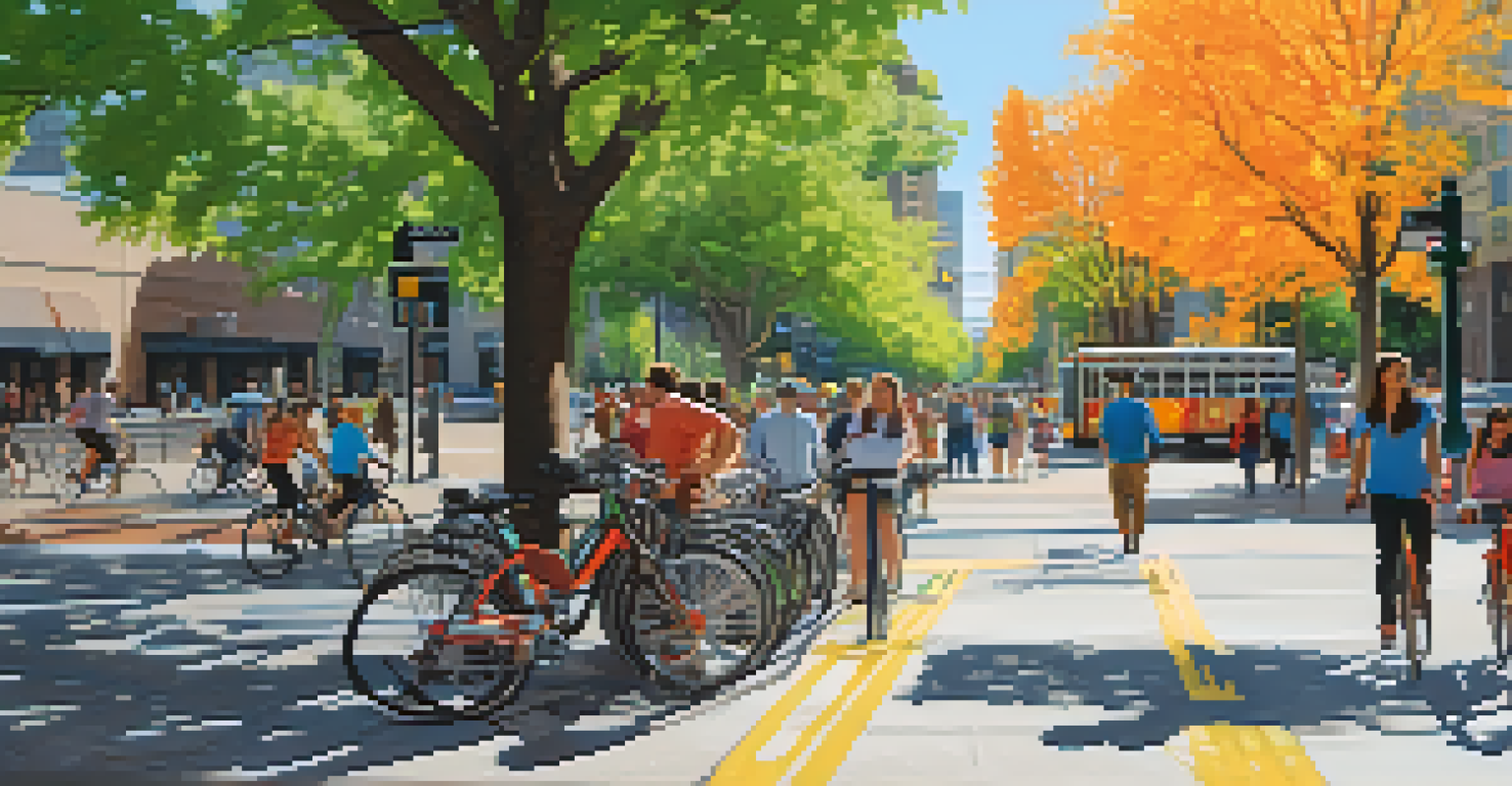Sustainable Urban Development Practices in Denver

Understanding Sustainable Urban Development in Denver
Sustainable urban development focuses on creating cities that meet the needs of today's residents without compromising future generations. In Denver, this means balancing environmental health, economic growth, and social equity. As the city grows, leaders are prioritizing green initiatives that enhance the quality of life for all.
Sustainable urban development is not just about the physical spaces we create; it's about the lives we enrich within those spaces.
One of the core principles of sustainable urban development is reducing the carbon footprint. Denver has set ambitious goals for carbon neutrality by 2040, which drives innovative practices in energy efficiency and transportation. This commitment reflects a broader trend seen in cities worldwide, where sustainability is no longer an option but a necessity.
Engaging the community is another vital aspect of sustainable development. Denver's residents are actively involved in shaping policies that affect their neighborhoods, ensuring that diverse voices are heard. This collaborative approach fosters a sense of ownership and accountability among citizens, making sustainability a shared goal.
The Role of Green Infrastructure in Denver's Urban Planning
Green infrastructure refers to the network of natural and semi-natural systems in urban areas that provide environmental benefits. In Denver, parks, green roofs, and permeable pavements are just a few examples of how the city incorporates nature into its design. These elements not only beautify the city but also manage stormwater and improve air quality.

For example, the South Platte River Greenway project has transformed neglected riverbanks into vibrant recreational spaces. This not only enhances biodiversity but also offers residents access to nature within the urban setting. It's a win-win situation that showcases how environmental restoration can coexist with urban development.
Denver's Commitment to Sustainability
Denver is actively pursuing sustainable urban development by integrating green practices in community planning, transportation, and energy efficiency.
Moreover, green infrastructure contributes to mitigating urban heat effects, making Denver more resilient to climate change. As temperatures rise, these green spaces provide cooling areas for residents, reducing reliance on air conditioning. This thoughtful integration of nature into urban planning demonstrates a forward-thinking approach to sustainability.
Transportation Innovations Supporting Sustainability
Transportation is a critical component of urban sustainability, and Denver is making strides in this area. The city is investing in public transit options, including light rail and bus rapid transit, to reduce reliance on cars. By providing efficient alternatives, Denver aims to decrease traffic congestion and lower greenhouse gas emissions.
The environment is where we all meet; where we all have a mutual interest; it is the one thing all of us share.
The development of dedicated bike lanes and pedestrian-friendly pathways is another initiative that encourages sustainable commuting. With more residents opting for bicycles or walking, the city is not only reducing its carbon footprint but also promoting healthier lifestyles. Imagine a morning commute where you can enjoy the fresh air instead of being stuck in traffic!
Additionally, Denver has embraced electric vehicles (EVs) by expanding charging infrastructure throughout the city. This shift towards EVs aligns with the goal of reducing emissions while providing residents with cleaner transportation options. It's an exciting evolution that positions Denver as a leader in sustainable urban mobility.
Energy Efficiency: A Key Priority for Denver
Energy efficiency is at the heart of Denver's sustainability efforts. The city has launched various programs aimed at reducing energy consumption in both residential and commercial buildings. Initiatives like the Energy Efficiency Program offer incentives for upgrades, helping residents save money while contributing to a greener city.
Moreover, Denver is committed to transitioning to renewable energy sources. By increasing investments in solar and wind energy, the city aims to power its operations sustainably. This shift not only benefits the environment but also creates job opportunities in the growing green energy sector.
Community Engagement is Essential
The city emphasizes community involvement in decision-making, ensuring diverse voices contribute to sustainability initiatives.
Community awareness and education play essential roles in promoting energy efficiency. Denver actively engages residents through workshops and resources that encourage sustainable practices at home. By empowering individuals with knowledge, the city fosters a culture of conservation that extends beyond policy.
Affordable Housing: Balancing Sustainability and Accessibility
As Denver continues to grow, ensuring access to affordable housing becomes increasingly critical. The city recognizes that sustainability and affordability must go hand-in-hand. Initiatives like the Denver Affordable Housing Fund help finance projects that prioritize eco-friendly construction while remaining accessible to all income levels.
Innovative designs, such as mixed-use developments, are also becoming more common. These projects combine residential, commercial, and recreational spaces, reducing the need for long commutes. By integrating living spaces with essential amenities, Denver is creating vibrant, walkable neighborhoods that enhance community well-being.
Furthermore, the city is exploring policies that promote energy-efficient housing, which can lower utility costs for residents. This dual focus on affordability and sustainability not only meets immediate housing needs but also contributes to the long-term resilience of the community.
Community Engagement in Sustainable Practices
Community engagement is a cornerstone of Denver's approach to sustainable urban development. The city actively involves residents in decision-making processes through forums, surveys, and workshops. This collaborative spirit ensures that the voices of diverse groups are heard and considered in planning initiatives.
For instance, local organizations often partner with the city to host events focused on sustainability, such as tree planting days or clean-up drives. These activities not only beautify neighborhoods but also foster a sense of community pride. When residents come together for a common cause, it creates lasting connections and a shared commitment to sustainability.
Innovative Waste Management Efforts
Denver's comprehensive recycling and composting programs aim for an ambitious waste diversion goal while promoting a culture of sustainability among residents.
Additionally, educational programs are vital in promoting sustainable practices among residents. By providing resources and information, Denver empowers individuals to make eco-friendly choices in their daily lives. This collective effort reinforces the idea that sustainability is a journey we all share.
Innovative Waste Management Solutions in Denver
Waste management is another critical area where Denver is implementing sustainable practices. The city has introduced a comprehensive recycling and composting program aimed at reducing landfill waste. By encouraging residents to recycle and compost, Denver is making significant strides in diverting waste from landfills.
Moreover, Denver's Zero Waste initiative sets an ambitious goal of achieving 80% waste diversion by 2030. This means not only recycling but also reusing materials whenever possible. Innovative programs, such as community swap events, allow residents to exchange unwanted items, further promoting a circular economy.

Education plays a crucial role in the success of these initiatives. The city regularly conducts outreach programs to inform residents about proper waste disposal methods and the benefits of reducing waste. By creating a culture of sustainability, Denver is paving the way for a cleaner, greener future.
The Future of Sustainable Urban Development in Denver
Looking ahead, Denver's commitment to sustainable urban development is stronger than ever. With ongoing investments in green technology and infrastructure, the city is poised to become a model for urban sustainability. This forward-thinking approach not only enhances the quality of life for residents but also attracts businesses and talent seeking a vibrant, sustainable environment.
Moreover, the city's adaptability in the face of climate challenges will be crucial. As Denver continues to grow, incorporating resilience into its urban planning will ensure that it remains a livable city for generations to come. This means not just focusing on current needs but also anticipating future challenges and opportunities.
Ultimately, the path towards sustainable urban development in Denver is paved by collaboration, innovation, and community engagement. As residents, city officials, and businesses work together, they can create a thriving urban ecosystem that balances economic, environmental, and social needs. The journey is just beginning, and there's much more to achieve.